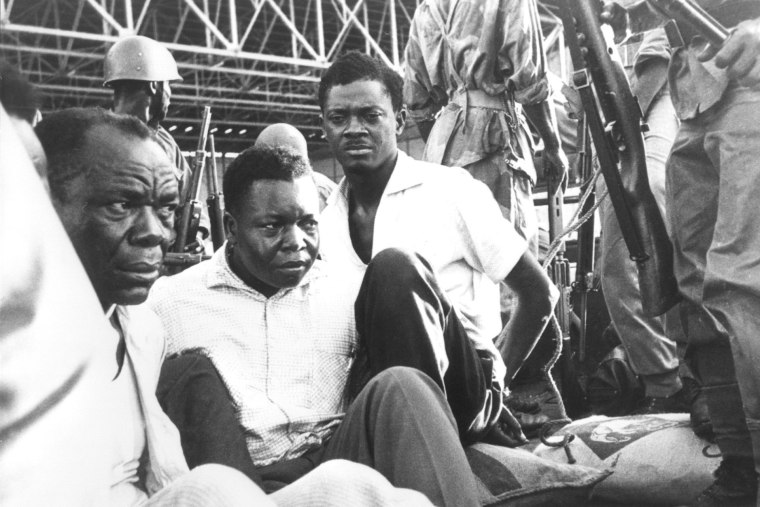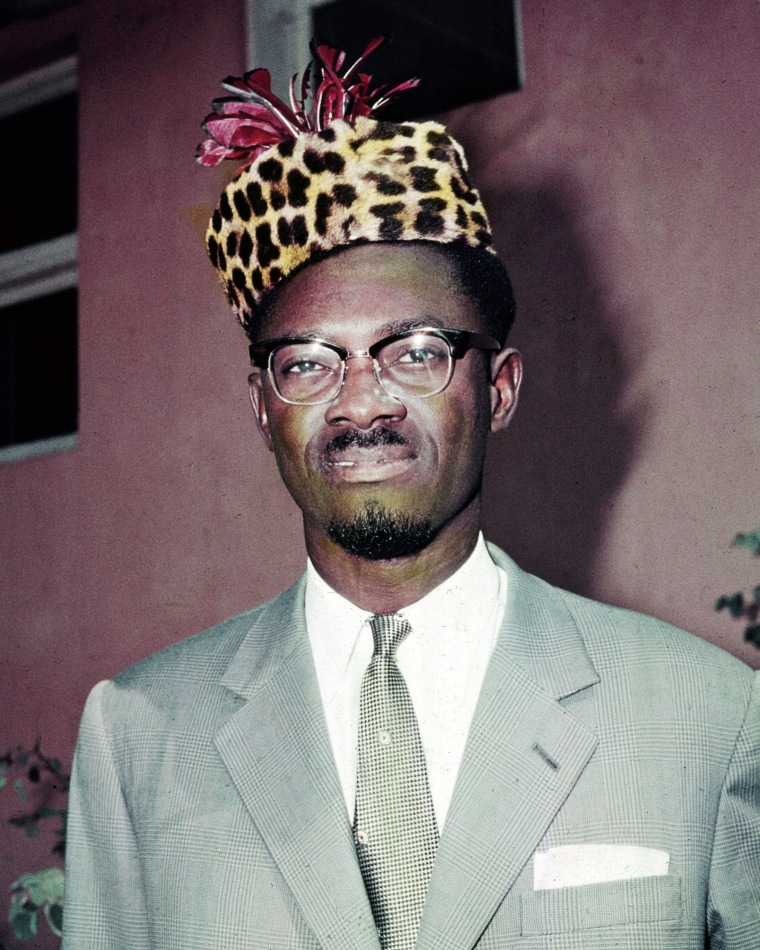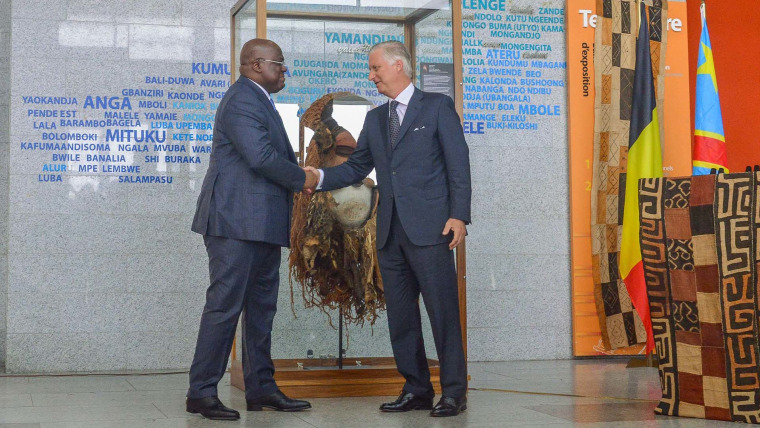A tooth believed to have been pulled from a man who once carried a nation’s hopes for freedom and democracy is finally going home.
The symbolic delivery of the remains of Congolese independence leader Patrice Lumumba is meant to ease the historic pain of a family and a country, but it also brings back memories of European colonialism and America’s covert war to contain Communism.
While Monday’s return of Lumumba’s tooth can be seen as an opportunity for Belgium to make amends amid ongoing global outrage over the 2020 killing of George Floyd, some are accusing Brussels of jumping at the opportunity without making a solid commitment to its historic to correct mistakes.
The return of what is widely believed to be Lumumba’s tooth means his family can finally have a “resting place where they can pray for their father,” said Brussels lawyer Christophe Marchand, of two of Lumumba’s five children, Francois and Roland , represents. Without the remains, they cannot mourn fully, he said.
Roland Lumumba told a news conference in Brussels on Friday: “I can’t say it’s a feeling of joy, but it’s positive for us to be able to bury our loved one.”
After being handed over to the family and an official ceremony in the Belgian capital, Lumumba’s tooth will return to the Democratic Republic of the Congo. Although the exact details are unclear, a homecoming tour is expected to bring the relic to Lumumba’s home village and end with an official funeral in the capital, Kinshasa.
African sovereignty
The Democratic Republic of the Congo, DRC for short, gained independence from Belgium in 1960. Lumumba’s recent election as the independent DRC’s first prime minister raised hopes that a break with colonialism would bring genuine democracy.
“We were so hopeful that independence would mean progress, better working and living conditions, greater prosperity, and the use of our national resources for the well-being of our people,” said Georges Nzongola-Ntalaja, professor of African Studies at the University of North Carolina.
For many Congolese Lumumba is a national hero and a “standard-bearer of the Congolese independence movement,” said Nzongola-Ntalaja, who has written extensively about Lumumba’s rise from postman and beer seller to leader of a nation. “We consider Lumumba to be a great chief and a great leader.”
His reputation stretched across the continent, said Reuben Loffman, lecturer in African history at Queen Mary University of London, who said Lumumba, a charismatic speaker, was “someone who, in desperate circumstances, stood up for African sovereignty and… died for this belief”.
But at the height of the Cold War, Lumumba was also perceived as a Soviet sympathizer, alarming the US and its Western allies.
Overthrown in a Western-backed coup three months after taking office, Lumumba was kidnapped, tortured and murdered in 1961 at the age of 35. His body was then dug up, dismembered and dissolved in acid by Belgian officers, one of whom said he pocketed a tooth as a “trophy”.
Thus, Lumumba’s family and country were deprived of a burial and grave.
Lumumba’s assassination remains part of the “national trauma” for the Congolese, Nzongola-Ntalaja said, and it has far-reaching implications for the nation. The new Congolese democracy dissolved in their wake, rocking the country the size of Western Europe.
When kleptocratic dictator Mobutu Sese Seko was ousted in 1997 after 32 years in power, the country was left in chaos, with one of the highest debt burdens among the developing world. Today, despite the enormous natural resources of the Democratic Republic of the Congo, most people hardly benefit from the riches of their country. It is the home of the world third largest population of poor people, according to the World Bank.
Although Belgian-backed Congolese separatists executed Lumumba in January 1961, an inquiry by the Belgian parliament 40 years later found that certain members of the Belgian state at the time “morally responsible‘ for the circumstances that led to his death. Then Prime Minister Guy Verhofstadt apologized in 2002 for Belgian involvement in Lumumba’s death.
Lumumba’s son Francois launched a separate investigation into his death in Belgium in 2011 to prosecute 10 Belgians over their connection to his father’s murder. It is ongoing, only two of the accused are still alive.
There are also lingering questions about the role the US may have played in his death.
The historical of the State Department reveal records that the US government launched a covert political program in Congo in 1960 that lasted almost seven years and was initially aimed at removing Lumumba from power and replacing him with a more pro-Western leader.
In 1975, a Senate committee investigated CIA plots to assassinate foreign leaders closed There was a separate, failed US plot to poison Lumumba, but no evidence was found that the CIA was connected to his assassination.
Nzongola-Ntalaja said the Senate committee’s conclusion was “disingenuous” because it ignored accusations of US responsibility in destabilizing Lumumba’s political standing.
“They concluded that because the CIA did not open fire on Lumumba, the CIA bears no responsibility in this matter,” he said. “They didn’t hold the gun and kill him, but the reality is that the CIA played a major role in removing Lumumba from the government as prime minister.”
The State Department and the CIA declined to comment.

Lumumba’s death capped decades of violent colonial rule and foreign interference in what is now the Democratic Republic of the Congo, so the return of Lumumba’s tooth is of “emblematic importance” for both nations, Belgian Prime Minister Alexander De Croo said last month.
The country’s monarch, King Philippe, reiterated his “deepest regret” for his nation’s colonial-era abuses in the DRC during a visit to the country this month, but stayed short of a formal apology. Belgium’s control of the vast region from 1885 to 1960 was marked by savage violence, during which millions were made slave labor, mutilations were commonplace, and the country’s natural resources were plundered.
But regret is not enough and Belgium should accept responsibility for its colonial past and Lumumba’s death, Nzongola-Ntalaja said.
Tooth a “trophy”
The existence of Lumumba’s tooth came to light in a 1999 interview with Gerard Soete, a former Belgian police commissioner in Congo, who admitted to digging up and cutting up Lumumba’s body before dissolving it in acid. Soete later told Ludo de Witte, who wrote a book about Lumumba’s murder, that he took the tooth “as a kind of trophy”.
Belgian authorities took possession of the tooth after Soete’s daughter showed it to journalists in 2016.
Whether the tooth came from Lumumba has not been confirmed by DNA analysis due to fears that DNA testing could destroy it. There is also speculation as to whether the tooth is Lumumba’s only remains. De Witte said Soete boasted that “he took several teeth and part of a finger”. It is not known if his claims are correct or where these remains are located.

In 2020, a Belgian court cleared the way for the tooth to be returned to the family shortly after Lumumba’s daughter, Juliana wrote a letter to the king, who asks for the return of her father’s “relics” and calls him “a hero without a grave”. Juliana Lumumba did not respond to requests for comment.
Belgian officials have called the tooth’s return “a new defining moment in the history of diplomatic relations between Belgium and the Democratic Republic of the Congo, following King Philippe’s visit to the Democratic Republic of the Congo in the second week of June,” De Croo said in a statement last month . “The remains of Patrice Emery Lumumba relate to our two countries’ common past, including its difficult episodes.”
DRC officials have not responded to requests for comment about the tooth donation and its importance to the nation.
But some people, including one of Lumumba’s sons, oppose the restitution.
Guy Lumumba said he believes the current DRC leadership is using his father’s name to ease relations with Belgium while the family is still awaiting justice.
Belgian anti-racism activist Mireille-Tsheusi Robert said the return was a “marketing ploy” allowing Belgium to improve its image without apologizing for its colonial injustices.
“We can’t fix a century of humiliation just by giving back Lumumba’s tooth,” she said.
